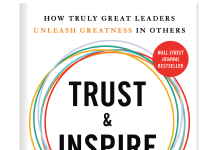With Gen Z constantly accessing their social media feeds and seeing what is going on around them 24/7, they live in constant fear that they are missing out on something. This is now playing out in how they want to pursue a career path… or better said, pathsssss.
David (Gen X): When it comes to career paths, all the generations have had some level of fear that they could be missing out. For Boomers, there was one path: up a ladder, and with each rung a fancier title and bump in pay. Any fear they had was because they knew there were fewer rungs the higher you went and the goal was to see how high you could make it.
At some point, you would settle into a rung as high up as you could get. When Xers came along, they really shook things up because they weren’t as caught up in a competitive climb to the top or what rung of the ladder they were on or their exact title. Any fear Xers had came from their skeptical sense that at any time the ladder could come crashing down.
Their mojo involved constantly getting bullets on the resume so that if something bad were to happen, they would be able to land on their feet somewhere else. Xers embraced things like lateral moves, which Boomers saw as the kiss of death.
In a Boomer’s eyes, a lateral move meant you were stepping aside for someone else to pass you on the race and climb to the top. However, in Xers’ eyes, a lateral move meant you were going somewhere else to learn a whole new set of skills, which only added more employment-friendly bullets to the resume. Then came the Millennials, who felt that if they were going to spend the majority of their days in a job, they’d better be making the world a better place. For them, meaning was the new money, and they were afraid they would end up in a job that wasn’t making a difference somewhere for someone.
Jonah (Gen Z): So now comes Gen Z and our greatest career fear will always be that we are missing out on something else that might be better. Once again, the workplace will be rocked, since Gen Z likely will want to pursue multiple paths at the same time. Our national study found that 75 percent of Gen Zers would be interested in a situation in which they could have multiple roles within one place of employment.
If you constantly fear you are missing out, it is hard to imagine putting in months and months in just one position in hopes that you may move up. It’s also very hard to imagine doing just one thing when you see everyone around you doing so many cool things. My generation imagines a scenario where we can do multiple jobs at one company. Is it such a stretch that I find a job at a company where I work with the PR or marketing team for part of my day to tap into my journalism passion, and sales or training another part of the day, since I love public speaking?
David (Gen X): Pressure will be on to keep careers exciting and Gen Zers less fearful that they might be missing out on something. It makes sense considering that the more you are doing, the less chance you will miss out on opportunities.
So many large companies are primed to attract Gen Zers because they can offer such a vast array of opportunities. However, many will miss the mark because they are still stuck in silos. It may just be that smaller companies will have an easier time with Gen Z. It’s not unusual for a smaller company to pitch thus: “Around here you get to wear a lot of hats because we are smaller. We need everyone to be able to do lots of different things. We aren’t like the big guys that have tons of departments with lots of people just doing one job.”
Granted, multiple jobs within one company might be too much for companies to implement for Gen Z. However, at a minimum, managers will need to offer Gen Z multiple projects to be tackling and switching between. The more these projects can be across different lines of business or functions, the less chance Gen Zers will feel they are missing out. Managers need to keep Gen Zers up to speed on how their project integrates with all the other efforts being made in the company.
Jonah (Gen Z): Companies that have embraced rotation programs will hit a homerun with Gen Z recruits. For example, Boeing offers two-year rotational programs in business, engineering, HR, and IT. Throughout the two years, new hires are exposed to a variety of business functions and have access to mentors and leaders across silos. Each part of the rotation offers new learning and development opportunities, new networking opportunities, and hands-on work experience. Rotation participants are also able to travel to different offices. From Southern California to Puget Sound to Oklahoma City, these Boeing recruits have an opportunity to explore many paths. It would be hard to feel as though you were missing out on anything when you get to see and experience so much.
David (Gen X): Then there are companies that aren’t even getting hung up on what jobs employees have at all. They are simply hiring them and putting them to work on different projects. When one project is over, the employee can move on to the next. Ideally at some point, these employees find a more permanent position. As much as this caters to Gen Z wanting to see and do a lot to avoid FOMO (fear of missing out), it is actually helping these companies with some FOMO of their own. They know a person is a great fit but they may not have an exact position in mind. They still know that there is a lot to do. Why fear missing out on a good employee when they see one? Just bring them in and get them started.
Intuit and Facebook, for example, are making offers to recruits without having a particular job description. Instead of looking for specific jobs or even expertise, these employers are on the hunt to uncover “transferable talents,” such as problem solving or analytical abilities. Marcus Buckingham, a consultant who has advised Facebook on employee evaluations, says, “Companies are realizing they should recruit for innate abilities or attitudes rather than skills applicable to a specific job.”
Excerpt from “Gen Z @ Work: How the Next Generation Is Transforming the Workplace” by David Stillman and Jonah Stillman. Copyright 2017 David Stillman and Jonah Stillman. Reprinted courtesy of HarperBusiness, an imprint of HarperCollins Publishers.
David Stillman (Gen Xer) is the coauthor of bestselling books “When Generations Collide” and “The M-Factor: How the Millennial Generation Is Rocking the Workplace.” He has contributed to Time, the Washington Post, The New York Times, and USA Today, and has been featured as a generational expert on CNN, CNBC, and the Today show. Stillman has been named one of the “200 to Watch” by Business Journal.
Jonah Stillman (Gen Zer) is a 17-year-old high school senior and currently the youngest speaker on the circuit. He was a nationally ranked alpine snowboarder and has served as an ambassador for the international nonprofit WE, traveling to Kenya and Ecuador to build schools. He is excited to be the voice of his generation and offer companies and organizations a heads-up about our next generation gap.




